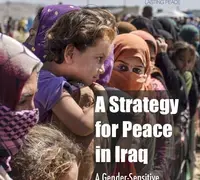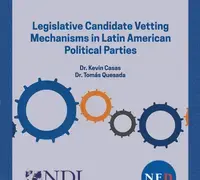Resources


A Strategy for Peace in Iraq: A Gender-Sensitive National Reconciliation Platform
A Strategy for Peace in Iraq: A Gender-Sensitive National Reconciliation Platform is a policy document presented by a group of 60 Iraqi women peace activists from the provinces of Anbar, Baghdad, Diyala, Kirkuk, Ninewa, and Salahaddin. The purpose of this document is to provide key actors in Iraq and the international community with a blueprint for building peace and promoting gender-sensitive policy priorities.

Breaking the Cycle of Exclusion in Political Party Development
Political parties are a key institution in democratic practice, yet they face a crisis of representation, with recent research showing that as many as 78 percent of citizens in some countries do not identify with any political party. Many citizens view them as inaccessible and unresponsive to their concerns.

Bridging the Divide: Youth and Parties Roundtable Discussion
NDI is implementing a program initative to identify opportunities for engagement and collaboration between youth-led organizations and political parties. As part of the initiative, NDI hosted a roundtable discussion of twenty experts in the youth and democracy development space in order to brainstorm potential solutions for bridging the divide between youth and parties.

Declaration in Support of Constitutionalism for Democratic Consolidation and the Peaceful Transfer of Power in Africa
A conference on Constitutionalism and Term Limits attended by former African heads of state, civil society leaders and media professionals gathered in Niamey, Niger, from October 2 to 4, 2019, at the invitation of NDI and its partners, the Kofi Annan Foundation, OSIWA and the Africa Forum, to discuss constitutionalism, democratic consolidation and the peaceful transfer of executive power across the continent.

Legislative Candidate Vetting Mechanisms in Latin American Political Parties
Few comparative studies exist on internal party candidate selection and vetting processes, resulting in a dearth of examples that political parties can draw from to establish and/or strengthen their internal review and selection mechanisms. This study aims to begin to fill this gap. The study provides an extensive literature review and case studies on how parties in Latin America have explored and implemented candidate vetting processes.
